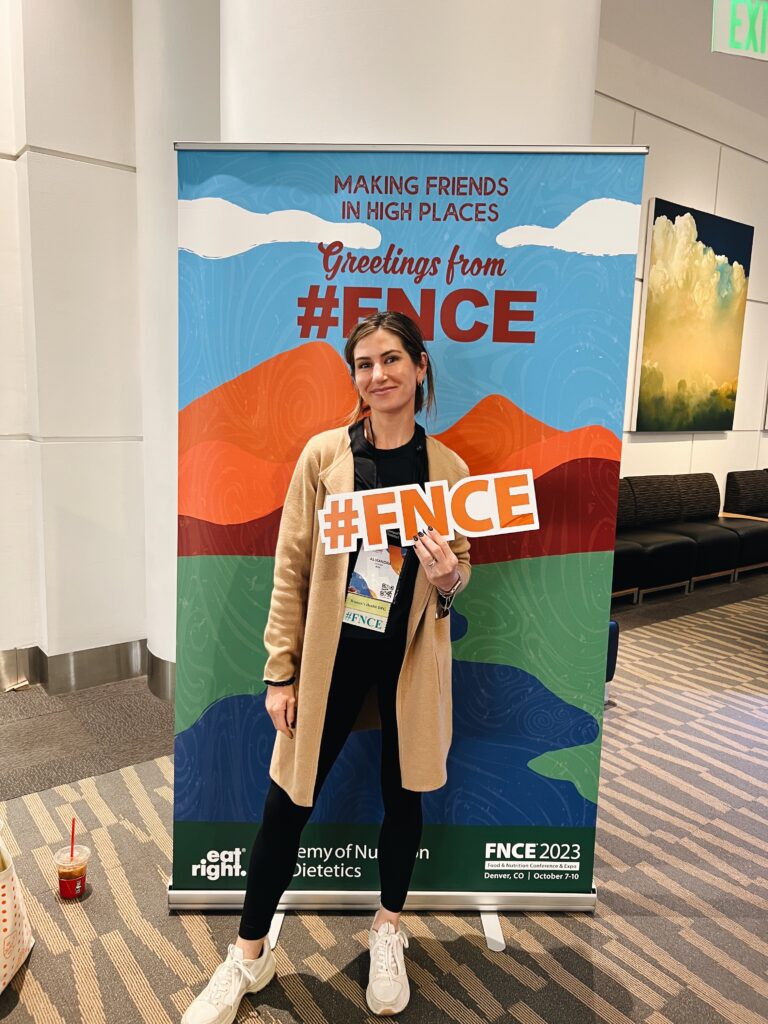
FNCE, which stands for Food and Nutrition Conference & Expo, is a national conference held yearly for Registered Dietitians. I’ve only been one other time in Nashville right before I got pregnant with Quinn.
I set this goal for myself and proud that I followed through with attending a national nutrition conference in 2023. I was hoping this conference would motivate me to get back in the nutrition field and it definitely did! It’s hard not to leave this conference and not feel more excited about this field.
The way the conference is set up is that there are about 3 days full of sessions. I only stayed for 2 days because that was aplenty for me. Each day there are about 4-5 different time slots with a bunch of sessions taking place at the same time. You have to choose one session out of about 10 per time slot that sounds most interesting to you. I went with my friend who practices in an outpatient cancer treatment center at Stanford, so she and I didn’t attend many of the same sessions. There is SO much variety in what is presented. There is also an expo with A TON of samples and freebies, poster sessions, break-out sessions and more. It’s a jam packed few days!
There was some interest from you guys about the little I shared on Instagram stories on the different sessions I attended. I thought it would be fun to share the biggest takeaways from my top 4 sessions I attended.
Anti-Obesity Medications
- Obesity is a chronic and complex disease and there are SO many controllable and uncontrollable reasons for weight
- Many of these medications are not new and some like Phentermine have been around since 1959
- Weight loss of even 5-10% improves obesity related comorbidities
- Although there is a lot of negative press about side effects, per clinicians working for years in this field there is minimal risk and minimal significant side effects observed
- There are two new weight loss drugs that will be on the market within the next 2 years similar to Ozempic. The market for these drugs is booming.
- The results of obese patients taking these drugs is significant. Taking the drug to help someone with clinical obesity lower their risk of comorbities outweights possible risk factors.
- The treatment plan is for these patients to be on this drug for a lifetime to maintain the weight loss.
Dermatology and Nutrition
- Foundational dietary behaviors for healthy skin: balance blood sugar, minimize pro-inflammatory foods, increase vitamins and minerals in diet, eat for strong metabolic health, diversify diet for gut microbiome health
- Misconceptions about healthy skin: extreme elimination diets, one pill supplement cure-all, topical only approaches
- A nourished body is key to good skin health. Restrictive eating harmful to skin.
- Acne areas of research observed: milk, glycemic index, omega 3 fatty acids, probiotics (more emerging science)
- Great resource and podcast
- High glycemic index (GI) eating patterns may exacerbate acne. High GI foods like ultra processed foods are digested more quickly than minimally processed foods causing rapid rise in blood glucose. This is a good tool. Low GI diet doesn’t mean low carb diet and also needs to take into account quality of food.
- Studies show a correlation between milk intake and acne. Milk and/or milk proteins may trigger acne-promoting pathways similar to high GI foods.
- Omega-3 rich diet may improve acne by reducing inflammation. Supplements are safe source.
- Probiotics may improve dysbiosis and improve skin health
Table Talk and Children
- “Table talk” is what we say to children while they are eating.
- 8 types of typical types of table talk that aren’t helpful: instructive, corrective, praise, conditional, obligatory, expectant, appreciative, closed-ended questions (see slide below)
- Changing table talk = less stress for parents and kids, changes what and how kids eat, and gets kids to practice eating-related skills
- Try open-ended prompts: “what are your eyes noticing with these peas?”
- Try reflective statements: “it seems like the veggies aren’t doing it for you…”
- The goal isn’t to get the child to eat better, but encourage curiosity and connection.
- Use adjectives to describe the food using 5 senses.
- With older kids avoid talking about what/how much/ or how your child is eating, avoid calorie, nutrition content, diets etc. Avoid stressful topics at meal times.
- Call food by it’s name not “good/bad” “junk/clean” “healthy/unhealthy”
- Focus on getting enough vs. too much and explore what makes food satisfying. Model enjoyment of food.
- Investigate if a teen is wanting to eat healthier not celebrate it.

The Impact of Ultra Processed Foods on Dietary Patterns, Appetite Regulation, and Health Outcomes
- There are 5 classes of foods: unprocessed or minimally processed (fruits, veggies, milk, eggs), process culinary ingredients (oils, honey), processed foods (canned food, peanut butter with simple ingredient labels), and ultra processed foods (UPF) (packaged foods)
- UPF usually contain emulsifiers, coloring agents, flavors (natural and artificial), flavor enhancers (MSG, artificial sweeteners, sodium chloride), thickeners (gums, pectins), anti-foaming, bulking, gelling agents.
- UPF higher in sodium, carbs, calories. People on high UPF diet consumed more than 500 calories a day on average.
- UPF foods are rapidly digested so there may not be any nutrients left by the time it reaches the ileum (where satiety signals are secreted) thus blunting the response to food and decreasing satiety from these foods. AKA you eat more!!
Let me know if you have any questions about my bullet points…I can explain more!
xx, A
Looking for healthy on the go breakfast options for when I don’t have time to eat before I leave the house. Things to eat while driving. Best healthy bar options?
OK! Will answer on happy hour this week.